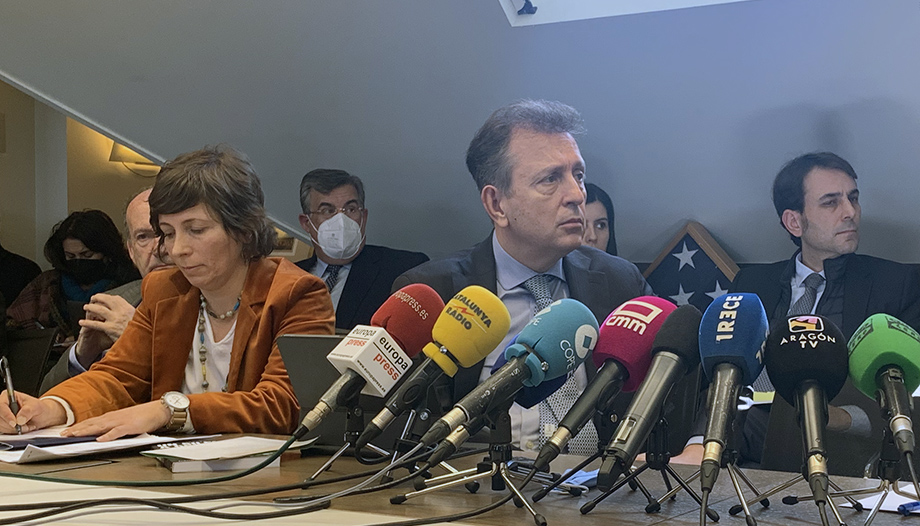Javier Cremades, president of Cremades & Calvo-Sotelo, has presented the members of the working group that are part of the independent audit, commissioned by the Spanish Episcopal Conference, in relation to the allegations of sexual abuse within the Catholic Church in this country.
On February 22, Bishop Omella, president of the Episcopal Conference presented this audit which has the objective of "knowing, clarifying and repairing the victims of sexual abuse in the Church".
Now the 28 members of the audit team have been presented. The audit team has been formed, in the words of Javier Cremades, with the objective of "carrying out the work entrusted to us with the greatest possible solvency".
Cremades has defended the willingness to collaborate shown by the Spanish Church "to investigate to the end and shed light on a question about which we do not have sufficient information".
Plurality of approaches
The team is composed of 28 people representing "different angles, specialties and ideological perspectives".
A "competent and plural" team, as described by the president of the Spanish law firm, who pointed out that six weeks ago they began "listening carefully to the victims in order to understand the truth, accompany them and take a first step towards reparation".
The victims, the focus of this audit, as three of the members of the firm who have met with them in recent weeks have been able to share their painful experience within the framework of this audit.
A fact that, according to Javier Cremades himself, "has had a profound impact on our conception of the problem. We have been able to meet with the associations and institutions that are raising their voices to demand justice, reparation and truth".
Cremades insisted that all victims' associations and individuals who have suffered these abuses "have an open door. We are not going to call the victims but we will be available to them".
The work team
The 28 people who will be part of this commission are:
Javier Cremades, Rafael Fernández Montalvo, Patricia Lee Refo, Carolina Marín Pedreño, Alfredo Dagnino, Katharina Miller, Carlos de la Mata, Martin Pusch, Jorge Cardona, Safira Cantos, Diego Solana, David Mills, Teresa Fernández Prieto, Ulrich Wastl, Marina Peña, Liza M. Velázquez, Pedro Strecht, Juan Carlos Gutiérrez, María Massó, Manuel Villoria, Fabiola Meco, Vicente Conde Martín de Hijas, Emilia Sánchez Pantoja, José F. Estévez, Juan Pablo Gallego, Myriam Salazar, Blanca Alguacil and Teresa del Riego.
An international team in which the participation of the partners of the law firm Westpfahl, Spilker, Wastl, in charge of the investigation carried out in Munich and three other dioceses in relation to this same matter, or Pedro Strecht, coordinator of the independent investigation that studies the abuses within the Portuguese Catholic Church, is noteworthy.
Also noteworthy is the presence of human rights activists such as Safira Cantos or psychologists specialized in these cases, such as Marina Peña.
In addition to these, three external persons will carry out various opinions and opinions that will be added to the investigation. In this case, Encarnación Roca will focus on the civil liability and compensation of the victims, Manuela Carmena will focus on the perspective and experience of the victims and, finally, Juan Luis Cebrián will focus on the social communication dimension of this matter, both in Spain and internationally.
During the presentation, all of them emphasized the challenge posed by an investigation of these characteristics and with such a varied team. One of the most notable interventions was that of Pedro Strecht, who addressed the Church itself, encouraging its members not to be afraid of this type of research: "This is not a work against the Church but with the Church and ultimately for you, for the Church".
In this regard, Javier Cremades stressed that "we will try not to disappoint either the victims or society as a whole" and reiterated the willingness of this team "for those who want to share their experience in any way they deem appropriate".

During the presentation of the team, Javier Cremades wanted to emphasize the three aspects of this investigation: first, the facts; second, the reparation of these crimes, which is not the direct responsibility of this law firm, and a third block of compliance to prevent the repetition of these behaviors in the future and to combat these crimes.
Collaboration with the Ombudsman's commission
Another point that was discussed at this press conference was the collaboration that this investigation will provide to the commission to be created by the Ombudsman for the investigation of sexual abuse by the Catholic Church alone.
Javier Cremades emphasized that "we are not here to compete but to collaborate in the commission created by the Government. We can collaborate with the contribution of data and experiences that we can collect". In this sense, Cremades pointed out that this commission "can reach areas and areas in which we do not have the possibility of entering".
Diocesan offices collect 506 cases
In the six weeks since the independent audit was launched, as confirmed by Javier Cremados, around 50 complaints have been filed and contacts have been initiated with different
associations and meetings with bishops. A high percentage of these complaints, 30%, refer to cases that have already been denounced in other areas.
On March 31, the offices for the protection of minors and prevention of abuse created in dioceses, religious congregations and other ecclesial institutions met in Madrid. A training meeting in which the 506 cases collected by these offices were also made known. Of these, 103 refer to persons known to be deceased and more than 70% are cases from the 20th century. The pastoral and welcoming nature of these offices makes it possible to deal with complaints, even if the accused is deceased or the case is time-barred from prosecution. The offices have also collected complaints about lay persons (61), priests (105) and religious (342) in addition to some complaints about unknown accused.








